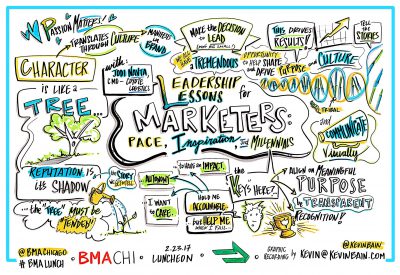
 It seems like every other article we read is either talking to or about millennials. What is it about this generation that’s so perplexing? Are they really so difficult to work with and lead?
It seems like every other article we read is either talking to or about millennials. What is it about this generation that’s so perplexing? Are they really so difficult to work with and lead?
As CMO of Coyote Logistics, Jodi Navta has been on a journey to understand millennials and what drives them. She says that only 29% of millennials feel engaged in their jobs. And because over 75% of Coyote’s workforce is made up of millennials, the company had to find a solution, fast.
In her BMA luncheon presentation on February 22nd, Jodi described the story of Coyote and its millennial employee base as one of growth. In just 10 years, the company went from $0 to $2 billion in revenue. They grew to about 2,400 employees in that time, and in 2015 were acquired by UPS. Their marketing program started from scratch five years ago and has since evolved into a powerhouse of intuitive engagement, both internally and externally. Clearly Coyote knows a great deal about creating a successful millennial-driven workplace.
Although Jodi’s presentation was angled toward understanding the modern millennial, I’d argue that her advice can be utilized by all companies when looking to better empower their most important asset — their people.
In order to gather crucial insight from the company’s millennials, employees were surveyed using the Waggl tool. Jodi was able to see how they defined Coyote’s purpose, how the company could improve internally, what the staff’s ideal manager looked like and what would help employees be more productive.
Coyote used the answers to respond directly to millennials’ concerns about transparency, autonomy and mentorship (among others). Here are the three strategies Coyote used to make it happen — strategies other companies can adopt to support their staff of all ages.
To develop a strong company culture, management has to be in tune with their employees. Are millennials reaching that one-year mark where we all know they’re going to flake? And if so, what are you going to do about it?
Using the results gathered from Waggl, Jodi’s team built a communications program centered on the needs of employees. The team used a high-impact intranet, built in a story format and using an abundance of video, to effectively communicate to their millennial employees.
Regular “Howler” email updates from the CEO, along with “Yip” shout-outs to current employees, directly responded to employees’ need for internal transparency and recognition.
Coyote’s surveys revealed another concern. Employees were looking for managers who listened, held their direct reports accountable and provided them with enough autonomy to make decisions, but were accessible enough to help employees pick themselves up again if they failed.
In response, the team instituted a three-day manager training workshop. Managers were able to learn from each other, receive face-to-face training and discuss common issues with multiple Q&A sessions.
This training resulted in managers who were also front-line leaders for Coyote. They display the characteristics of all good managers: intuition and a willingness to help their team grow and develop in their professional careers.
Jodi pointed out that understanding and believing in a company’s purpose is crucial for productivity and company culture. Your purpose should be self-evident. It should be something your employees live and breathe — not a plaque on a wall that no one looks at or a mission statement that’s only located on the company’s “about us” page.
A company’s purpose needs to be nurtured, guided, tended to. It’s a living and breathing entity that should develop over time, resulting in a strong company character. Employees who are fully immersed in that culture will be engaged. They’ll be productive. As Jodi affectionately described, their employees are all part of the pack. They take care of each other.
As a millennial myself, I do question the overemphasis on our generation. Is it true that somehow we’re more complex, entitled and unique than our predecessors? Or does every generation that joins the workforce have their own quirks that seem perplexing to the generation prior? We can all agree that the pace of change has been exponential over the last century, causing clearer differentiators between us, our parents and our grandparents. To Jodi’s point, the problem isn’t millennials. It’s a company’s ability to adapt to change and be intuitive to the needs of its most important asset: its people, regardless of which generation they come from.
At the end of the day, every company has the potential to create a dynamic culture. But leadership must be attuned to its employees’ needs and willing to make changes in order to meet those needs. After all, a company with a strong sense of purpose and the ability to adapt is a powerful one.
Categories: Blog
We're heading back to Lizze McNeil's by popular demand! Join fellow B2B marketers for some social networking on the patio along the Chicago River. New friends welcome! $35/person: open bar +…
© 2021 Business Marketing Association Chicago Chapter
